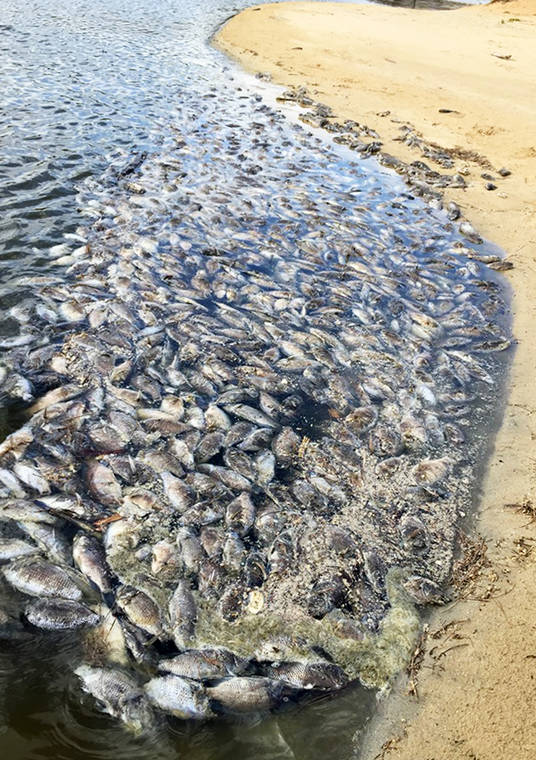
Sunrise Capital, Inc. owns the island of Kauaʻi’s only shrimp farm and is seeking a new pollutant permit, known as an “NPDES permit,” from the Hawai‘i Department of Health (“DOH”), which is raising concern from the Surfrider Foundation Kaua'i Chapter. The proposed permit, which is supposed to ensure compliance with the federal Clean Water Act, would allow the shrimp farm to continue discharging certain pollutants within certain parameters. Under its current permit, residents have witnessed large fish kills that flow down the shrimp farm's ditches and end up in the ocean. The result is polluted and dangerous water. DOH is holding a public hearing on the proposed permit, where members of the public can raise their concerns. Ultimately, the Chapter wants the permit to be denied or improved so the resulting pollution from the shrimp farm does not violate the federal Clean Water Act.
Access the permit documents here.
We Need Your Help to Make This a Stronger Permit!
1. Attend the public hearing to show support and provide oral testimony:
Date: Wednesday, November 13, 2024
Time: 10:00 a.m.
Location: Kekaha Agriculture Association Building
7189-D Kaumualii Highway
Kekaha, Hawaii 96752
2. If you can't make in person register to attend online.
3. Email your written comments to cleanwaterbranch@doh.hawaii.gov by 4:30 p.m. on Wednesday, November 13.
Below are talking points to help craft your testimony:
Point 1: Address Harmful Recreational and Environmental Impacts
- The shrimp farm sets off a cascade of pollutants which flow into our ocean and waterways with toxic impacts to the marine environment and public health. Nutrients from the feed and waste materials lead to de-oxygenated water and increased acidity which lead to the observed fish kills. Decomposing fish then releases hydrogen sulfide, bacteria and viruses that can be harmful to public health. Additionally, tank cleaning chemicals including clorox flow into the waterways and out to the ocean. Most noticeable is the rotten egg smell of hydrogen sulfide which is extremely toxic to humans when inhaled.
- Dead fish and pollution from the shrimp farm flow through canals to the ocean where swimmers, surfers, and fishers are affected by the polluted waters. There are concerns that the dead fish bring sharks in close to the recreational area.
- The discharges run adjacent to the Department of Land and Natural Resources Kawai‘ele State Waterbird Sanctuary and likely affect the groundwater in these constructed wetlands, posing a threat to protected waterbirds.
- All of the shrimp farm’s settling ponds, basins, and ditches should be lined.The shrimp farm’s settling ponds are currently unlined, so this wastewater likely seeps through the sand and into First Ditch, which flows directly into the ocean near MacArthur Beach Park. It may also diffuse directly into nearest beach waters.
- Personalize your testimony! Let DOH know if you use this area for recreating or if you avoid recreation at this area because of known pollution from the shrimp farm.
Point 2: The Proposed Permit has Weak Water Quality Protections
- The proposed permit sets weak effluent limitations. Effluent limitations are the primary mechanisms by which an NPDES permit regulates and controls water pollution, and are inadequate for proper regulation of this shrimp farm.
- Offshore water quality monitoring is planned to take place too far from the coastline, which may render results useless. For coastal users and recreationalists, the safety of nearshore waters is of critical importance, and there should be more focus on monitoring at points closer to shore.
- DOH should regulate Canal D (so called Suez Canal) as an inland estuary to ensure that nutrient, oxygen, and turbidity levels are safe.
- DOH should also conduct new environmental review on the project due to the many changes to the shrimp farm facility and its operations since the last Environmental Assessment (“EA”) was prepared 24 years ago (in 1998). There should be no NPDES permit issued until an amended EA is accepted by DOH.
Point 3: The Proposed Permit does not Address Fish Kill Concerns
- The proposed permit lacks meaningful measures to prevent fish kill incidents. This particular shrimp farm has been associated with a number of fish kills over the past several years. During these incidents, massive quantities of dead fish have spilled from the ditches onto the shoreline and into the nearshore waters. This creates a public health and safety hazard and impairs public use.
- While there are permit notification and cleanup requirements for fish kills, the permit is sorely lacking in prevention measures to stop this from happening in the first place.
Point 4: Lack of Coordinated Regulation of Mānā Plain Ditches
- The shrimp farm’s permit should be considered alongside and in the same process as the state Agribusiness Development Corporation’s (“ADC”) draft NPDES permit (published October 29, 2024), since the shrimp farm and ADC share an ocean outfall that pollutes the ocean at Major’s Bay.
- Discharge from the shrimp farm travels from Canal D (so called Suez Canal) and into Kinikini Ditch, which collects pollution from both the shrimp farm and ADC lands before discharging into the ocean at the Kawai‘ele outfall/Major’s Bay.
- Discharges from the shrimp farm should be regulated together in the same permit or process as discharges from ADC to ensure that these discharges combined meet water quality standards. This is especially important to avoid continued finger-pointing between the shrimp farm and ADC about who is to blame for fish kills and how they can be prevented in the future.
- Recently (on October 29, 2024), DOH issued a draft NPDES permit to ADC and the County of Kauaʻi for discharges from seven ocean outfalls along the Mānā Plain, including Kinikini Ditch. Because the ADC/County draft permit and the shrimp farm draft permit are all currently out for public comment, DOH could easily consolidate both permits into one process, streamlining the permitting process for all.
